大学生应该创业吗(中英文)
大学是否要创业作文英文

大学是否要创业作文英文Universities should encourage entrepreneurship among their students. 大学应该鼓励学生创业。
Encouraging entrepreneurship among students can lead to innovation and economic growth. 鼓励学生创业可以促进创新和经济增长。
When students are given the opportunity and support to start their own businesses, they are able to apply the knowledge and skills they have gained in the classroom in a real-world setting. 当学生有机会和支持去开展自己的业务时,他们能够将在课堂上学到的知识和技能应用于现实世界中。
This not only benefits the individual student, but also contributes to the overall economic development of the country. 这不仅有利于个体学生,而且有助于国家的整体经济发展。
Moreover, by fostering a culture of entrepreneurship, universities can inspire creativity and problem-solving skills among students. 此外,通过培养创业文化,大学可以在学生中激发创造力和解决问题的技能。
Entrepreneurs are often required to think outside the box and come up with innovative solutions to challenges they may face. 创业者通常需要跳出固有思维,并提出对他们可能面临的挑战创新的解决方案。
大学是否要创业作文英文
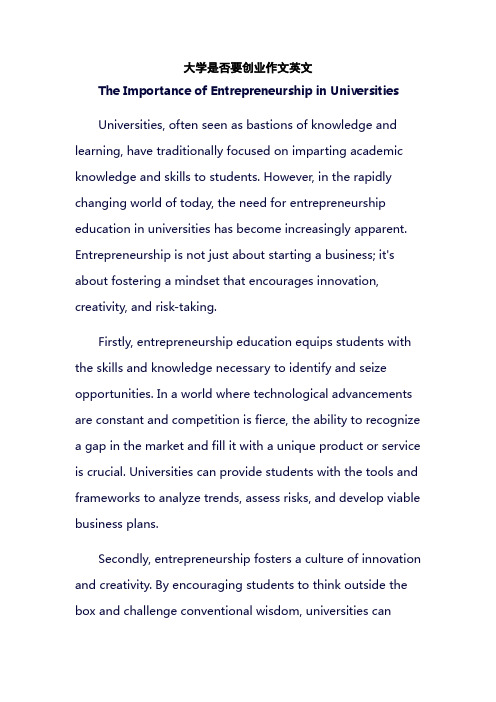
大学是否要创业作文英文The Importance of Entrepreneurship in UniversitiesUniversities, often seen as bastions of knowledge and learning, have traditionally focused on imparting academic knowledge and skills to students. However, in the rapidly changing world of today, the need for entrepreneurship education in universities has become increasingly apparent. Entrepreneurship is not just about starting a business; it's about fostering a mindset that encourages innovation, creativity, and risk-taking.Firstly, entrepreneurship education equips students with the skills and knowledge necessary to identify and seize opportunities. In a world where technological advancements are constant and competition is fierce, the ability to recognize a gap in the market and fill it with a unique product or service is crucial. Universities can provide students with the tools and frameworks to analyze trends, assess risks, and develop viable business plans.Secondly, entrepreneurship fosters a culture of innovation and creativity. By encouraging students to think outside the box and challenge conventional wisdom, universities cannurture a generation of problem-solvers who are not afraid to take risks and pursue their passions. This kind of mindset is not only beneficial for those interested in starting their own businesses but also for those who want to make a difference in any field they choose to enter.Moreover, entrepreneurship education helps students develop a sense of self-reliance and resilience. Starting a business or pursuing an innovative idea often involves overcoming obstacles and setbacks. By learning to navigate these challenges, students gain valuable life skills that will help them succeed not just in their professional lives but also in their personal ones.Finally, universities have a role to play in contributing to economic growth and societal development. By fostering an entrepreneurial culture, universities can produce graduates who are not just job-seekers but also job-creators. These graduates can go on to start their own businesses, generate employment opportunities, and contribute to the overall economic vitality of their communities.In conclusion, entrepreneurship education in universities is essential for preparing students for the challenges andopportunities of the 21st century. It not only equips them with the skills and knowledge necessary to succeed in the business world but also fosters a mindset that encourages innovation, creativity, and risk-taking. By investing in entrepreneurship education, universities can play a pivotal role in shaping a more innovative and entrepreneurial society.。
大学生是否该创业英语作文
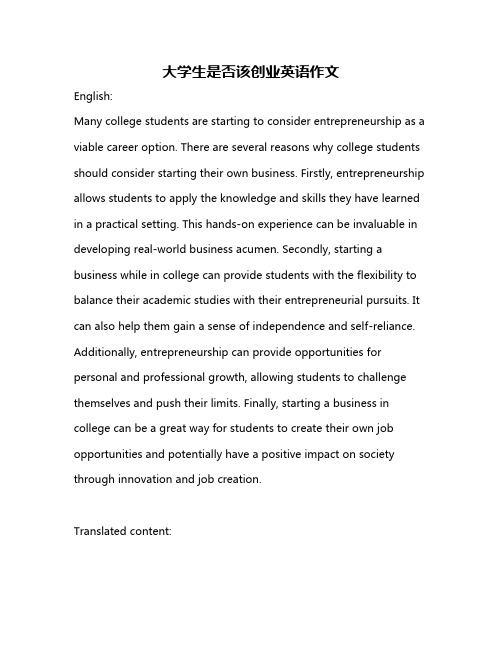
大学生是否该创业英语作文English:Many college students are starting to consider entrepreneurship as a viable career option. There are several reasons why college students should consider starting their own business. Firstly, entrepreneurship allows students to apply the knowledge and skills they have learned in a practical setting. This hands-on experience can be invaluable in developing real-world business acumen. Secondly, starting a business while in college can provide students with the flexibility to balance their academic studies with their entrepreneurial pursuits. It can also help them gain a sense of independence and self-reliance. Additionally, entrepreneurship can provide opportunities for personal and professional growth, allowing students to challenge themselves and push their limits. Finally, starting a business in college can be a great way for students to create their own job opportunities and potentially have a positive impact on society through innovation and job creation.Translated content:许多大学生开始考虑创业作为一种可行的职业选择。
关于大学生应不应该创业的英语作文
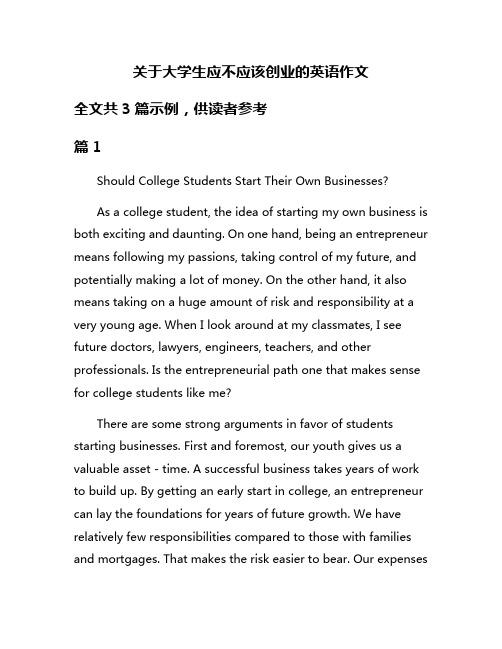
关于大学生应不应该创业的英语作文全文共3篇示例,供读者参考篇1Should College Students Start Their Own Businesses?As a college student, the idea of starting my own business is both exciting and daunting. On one hand, being an entrepreneur means following my passions, taking control of my future, and potentially making a lot of money. On the other hand, it also means taking on a huge amount of risk and responsibility at a very young age. When I look around at my classmates, I see future doctors, lawyers, engineers, teachers, and other professionals. Is the entrepreneurial path one that makes sense for college students like me?There are some strong arguments in favor of students starting businesses. First and foremost, our youth gives us a valuable asset - time. A successful business takes years of work to build up. By getting an early start in college, an entrepreneur can lay the foundations for years of future growth. We have relatively few responsibilities compared to those with families and mortgages. That makes the risk easier to bear. Our expensesare low living in dorms or apartments. And most of us don't yet have spouses or children relying on us financially. So in that sense, we're in a perfect position to take a chance on an unproven business idea.Secondly, the energy and enthusiasm of youth is a plus when taking on a new entrepreneurial venture. We're fearless and brimming with ambition and new ideas. Older entrepreneurs can get set in their ways or become rigid in their thinking. But we college students see the world with fresh eyes. We embrace innovation, take risks, and aren't afraid to challenge conventional thinking. An unencumbered, youthful perspective is a real advantage.Additionally, starting a business as a student gives us incredibly valuable real-world experience. It forces us to develop a multitude of practical skills like budgeting, marketing, sales, operations, people management, and more. We get a head start over our peers in building a professional network. And even if the business ultimately fails, those lessons will still prove useful when we eventually enter the workforce. Experiencing the highs and lows of entrepreneurship first-hand is truly an invaluable education.There are also significant downsides to consider though. Our inexperience and lack of business skills is a huge hurdle. We may be energetic and creative, but we still have so much to learn about actually running a company successfully. Financing a new startup is extremely difficult at any age, but it's especially challenging for students who typically have little money, no credit history, and no track record of success. And since most new businesses fail within a few years, we're risking our future career prospects if we completely forgo things like internships and entry-level jobs in our chosen industry.Furthermore, the extreme stress of starting a company is not for everyone. Juggling classes, homework, extracurriculars, family life, and social lives is hard enough. Adding a brand new business into that mix means taking on an immense workload that could severely impact our studies, mental health, and overall college experience. For every wildly successful student entrepreneur, there are countless others who crashed and burned trying to do too much. Not everyone is prepared for that level of perpetual anxiety and burnout.At the end of the day, I believe there is no universal right or wrong answer. Starting a business in college makes sense for some students but not for others. It depends on our individualskills, interests, financial circumstances, personality traits, and appetite for risk versus reward. Those of us passionate about a specific business idea, comfortable with uncertainty, and motivated by being our own boss, may be well-suited for the startup route. But students simply looking to minimize stress, learn their core academic subjects, and maximize social time may be better off focusing solely on their degrees.My personal view is to at least start small. Rather than diving into launching a official startup, I'm trying some lower-risk ways to get experience like freelancing, running an Etsy shop, doing paid internships at local startups, and participating in business plan competitions. This lets me get my feet wet in entrepreneurship but without risking everything on onemake-or-break venture. Down the road after graduating, if I'm passionate about a specific idea, I'll be in a better position then to pursue it more seriously. But if not, these experiences ensure I'll still gain valuable skills to prepare me for more traditional career paths as well.In the end, an entrepreneurial mindset has value whether you start a company or not. The ability to think creatively, market yourself, adapt to change, and capitalize on opportunities - those entrepreneurial qualities are great assets no matter whatpath we choose after college. So while not everyone may launch the next big tech unicorn as a student, stretching our entrepreneurial muscles in some form during these years enhances our future prospects no matter what we decide to do with our lives and careers. With that said, students considering starting an official business need to carefully weigh the potential rewards against the substantial commitment and sacrifices required to get a new venture off the ground. But for those willing to put in the work, the entrepreneurial path in college can open up many exciting possibilities.篇2Sure, here's an essay on whether or not college students should start their own businesses, written in the style of a student's voice. It's approximately 2,000 words long and in English.Title: The Entrepreneurial Dilemma: Should College Students Pursue Their Business Dreams?College life is a whirlwind of experiences, opportunities, and decisions that shape our future paths. Among the many choices we face is whether to dive headfirst into the entrepreneurial world or stick to the traditional path of academics and eventualemployment. It's a dilemma that has sparked heated debates and divided opinions, with valid arguments on both sides. As a fellow student grappling with this very question, I've spent countless hours weighing the pros and cons, and I'd like to share my thoughts on this complex issue.On one hand, the allure of entrepreneurship is undeniable. The prospect of being your own boss, turning your innovative ideas into reality, and potentially striking it rich is a dream that many of us harbor. After all, who hasn't fantasized about being the next Mark Zuckerberg or Elon Musk, disrupting industries and leaving an indelible mark on the world? The success stories of college dropouts-turned-billionaires like Bill Gates and Steve Jobs only fuel our entrepreneurial aspirations.Moreover, the college experience itself can be an ideal breeding ground for entrepreneurial ventures. With access to a diverse pool of talent, cutting-edge research, and a supportive ecosystem, campuses can provide the perfect incubator for launching startups. Many universities even offer entrepreneurship programs, mentorship, and funding opportunities to encourage student-led businesses. It's an environment ripe with creativity, youthful energy, and awillingness to take risks – qualities that are essential for any successful entrepreneur.However, the path of entrepreneurship is also fraught with challenges and uncertainties. Starting a business from scratch requires an immense amount of time, effort, and financial resources – luxuries that many college students simply don't have. Juggling classes, extracurricular activities, and the demands of running a company can be an overwhelming endeavor, often leading to burnout or compromised academic performance.Furthermore, the statistics on startup success rates are sobering. According to various studies, a staggering 90% of startups fail within the first few years, largely due to a lack of funding, poor market fit, or inexperience in business management. As students, we may have brilliant ideas, but we often lack the real-world experience, industry knowledge, and resilience required to navigate the treacherous waters of entrepreneurship.Even if a student-run business manages to gain traction, there's the question of opportunity cost. By dedicating our prime years to building a company, we may miss out on valuable internships, networking opportunities, and the chance to exploredifferent career paths. These experiences can be crucial for personal and professional development, as well as securing a stable job after graduation.On the flip side, proponents of the traditional academic route argue that a college education provides a solid foundation of knowledge, critical thinking skills, and a well-rounded perspective – assets that are invaluable in any career, including entrepreneurship. By focusing on our studies and gaining relevant work experience through internships or part-time jobs, we can better prepare ourselves for the challenges that lie ahead, whether we eventually choose to start our own businesses or pursue more conventional employment.Personally, I find myself torn between these two paths. As someone with a passion for innovation and a desire to leave my mark on the world, the entrepreneurial route holds a strong appeal. The idea of turning my creative visions into tangible products or services that can positively impact people's lives is exhilarating. At the same time, the risks and uncertainties associated with entrepreneurship give me pause.After much contemplation, I've come to the conclusion that the answer lies in striking a balance. Instead of rushing headlong into entrepreneurship or dismissing it entirely, I believe thewisest approach is to explore and nurture our entrepreneurial inclinations while simultaneously prioritizing our academic pursuits.This can take various forms, such as participating in entrepreneurship clubs or competitions, taking relevant courses, or working on side projects that allow us to develop our business acumen. By doing so, we can gain invaluable experience and test our ideas without compromising our educational goals. If our ventures show promise, we can then decide whether to pursue them full-time after graduation or use the knowledge gained to secure employment and potentially start a business further down the line.Ultimately, the decision to embrace entrepreneurship as a college student is a deeply personal one, influenced by our individual goals, risk tolerance, and passion. However, regardless of the path we choose, it's crucial to approach the decision with a clear understanding of the challenges and opportunities inherent in each option.For those of us who possess the drive, resilience, and unwavering determination to turn our dreams into reality, entrepreneurship can be a rewarding and fulfilling journey. But for those who prefer a more structured and stable path, focusingon academics and gaining relevant work experience can be equally rewarding, opening doors to a wide array of career opportunities.The beauty of our college years lies in the freedom to explore, experiment, and discover our true passions. Whether we choose to dive into entrepreneurship or follow a more conventional route, the experiences and lessons we gain during this formative period will undoubtedly shape our future endeavors and contribute to our personal and professional growth.篇3To Start a Business or Not as a University Student?That is the million dollar question these days. With the rise of entrepreneurship being glorified in the media and successful college dropouts like Mark Zuckerberg and Bill Gates being idolized, more and more students are questioning whether they should put their studies on hold to chase their own startup dreams. On one hand, my peers who have taken the entrepreneurial plunge talk about the incredible freedom, pride of ownership, and skyrocketing potential rewards of starting your own company. But on the other side, my more risk-averseclassmates warn about the dangers of jeopardizing our education and undercutting our future career prospects because of a failed business venture. As a 20-year-old university junior myself, I've given this dilemma a ton of thought.When I imagine being a student entrepreneur, I get pretty excited about the idea. Creating something from scratch and being your own boss definitely has its allures. Instead of struggling through classes that don't always seem relevant and jumping through hoops to impress corporate recruiters, I could be designing my own product or service to actually solve a problem that I'm passionate about. While my friends are pulling all-nighters cramming for finals, I could be grinding away building something real and tangible instead of just muddling through rote assignments. And if my startup starts generating real revenue and profit, I could theoretically bid adieu toentry-level corporate drudgery and be already running my own show by my early 20s rather than having to spend a decade toiling my way up the ranks. No more agonizing over getting the perfect summer internship to boost my resume or stressing about brutal 100-hour weeks at a huge law or consulting firm just to get my foot in the door. Just pure flexibility, autonomy, and fastrap- id career growth if my business takes off.Those upsides are immensely seductive, no doubt. But I also can't ignore those logical nagging doubts in the back of my mind about the astronomical risks involved. Founding a startup company is like taking the world's biggest gamble. The failure rates are absolutely daunting - over 90% of new businesses ultimately go belly up within a few years. And with that failure would come disaster: my college years and tuition dollars flushed down the drain, zero academic credential to fall back on, and a tarnished professional reputation in the eyes of potential future employers who would consider me a dropout risk. By putting all my eggs in the entrepreneurial basket, I would essentially be kissing financial security goodbye for the foreseeable future in exchange for a long-shot chance at hypothetical success that the vast majority of startups never attain. My parents and relatives would probably go into conniptions as well about me squandering my educational opportunities and jeopardizing my future over some youthful pipe dream.So those are the clashing perspectives that have been battling it out in my mind recently. Part of me is extremely tempted by the motivational startup success stories and portrayal of entrepreneurs as bold visionaries and rhetic company-building rockstars. But the realist in me keeps gettinghung up on the extreme difficulty of actually pulling that off and the safety net that a college degree provides. At least with an education under my belt, I would have a respectable fallback option and established credentials to join the job market if my business bombed, whereas dropping out with no qualifications would be apocalyptically risky.Ultimately, after much agonizing about this quandary, I think I've settled on a balanced perspective and gameplan. I absolutely want to keep an open mind towards entrepreneurship and take steps during college to nurture those inclinations and gain exposure to the startup world. Things like taking business classes, joining entrepreneurship clubs, entering pitch competitions, and maybe even building out a prototype or minimum viable product for one of my business ideas seem invaluable. That way I'm at least developing some of the mindset and skills to potentially take that route someday. But I'm fairly certain that I don't want to actually take the radical step of dropping out of school entirely or shelving my studies to go all-in on a startup idea before graduation.To me, the smartest approach is to gain that entrepreneurial training while still completing my bachelor's degree as a form of insurance. That credential will serve as a safety net - if my startupdreams don't pan out, I'll be able to get hired at a normal company without having prematurely tanked my career prospects. And in the meantime, I'll be better positioned to attract investors, partners, or acquirers if I do launch a promising business because I'll be seen as less of a risk. At age 22 with a diploma in hand and maybe even an MVP to shop around, my entrepreneurial ambitions will come across as far less flakey and ungrounded since I'll have proven academic discipline under my belt.So in summary, I believe the ideal path is to keep an open mind and actively work on sharpening my entrepreneurial skillset and exploring opportunities while still being pragmatic enough to not put my entire future at stake without a Plan B. Surround myself with other entrepreneurially-minded people, keep generating and validating business ideas, and build up my experiences and resume with an eye towards potentially striking out on my own someday. But hold off on actually abandoning my studies or starting a company until I have that degree in my back pocket. With an intelligent blend of pragmatism and boldness, I believe I can get the best of both worlds - playing it safe while still dreaming big and working diligently to make those dreams a reality someday. It's all about balancingresponsibilities and risks in the short-term to maximize opportunities in the long run.。
大学生要敢于创业的英语作文
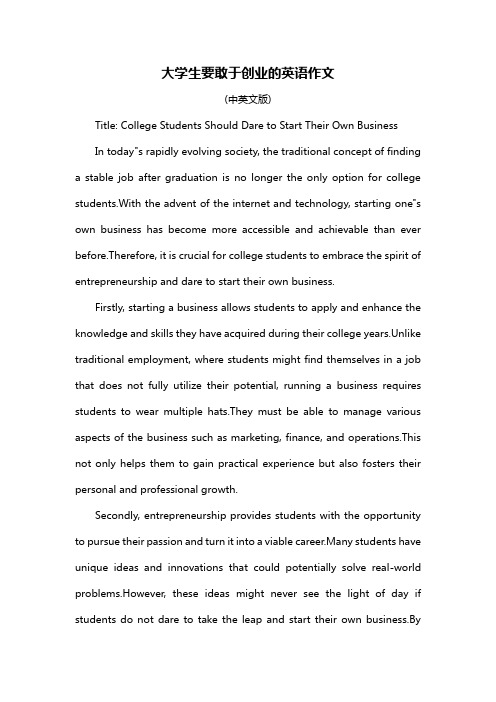
大学生要敢于创业的英语作文(中英文版)Title: College Students Should Dare to Start Their Own BusinessIn today"s rapidly evolving society, the traditional concept of finding a stable job after graduation is no longer the only option for college students.With the advent of the internet and technology, starting one"s own business has become more accessible and achievable than ever before.Therefore, it is crucial for college students to embrace the spirit of entrepreneurship and dare to start their own business.Firstly, starting a business allows students to apply and enhance the knowledge and skills they have acquired during their college years.Unlike traditional employment, where students might find themselves in a job that does not fully utilize their potential, running a business requires students to wear multiple hats.They must be able to manage various aspects of the business such as marketing, finance, and operations.This not only helps them to gain practical experience but also fosters their personal and professional growth.Secondly, entrepreneurship provides students with the opportunity to pursue their passion and turn it into a viable career.Many students have unique ideas and innovations that could potentially solve real-world problems.However, these ideas might never see the light of day if students do not dare to take the leap and start their own business.Bydoing so, they not only have the chance to make a difference in the world but also create job opportunities for others, thereby contributing to the economy.Lastly, starting a business early in life can lead to greater success in the long run.Failure is an inevitable part of the entrepreneurial journey, but it is also a valuable teacher.By starting young, students have more time to recover from setbacks, learn from their mistakes, and iterate their business models.This iterative process can help them to refine their strategies and increase their chances of success in the future.In conclusion, the era of entrepreneurship has arrived, and college students should seize the day and embrace the spirit of entrepreneurship.By starting their own business, they can apply their knowledge, pursue their passion, and lay a solid foundation for future success.Aspiring entrepreneurs should not be deterred by the risks and challenges involved, as the potential rewards are immeasurable.So, let us boldly step into the world of entrepreneurship and create a brighter future for ourselves and for generations to come.。
关于大学生应不应该创业的英语作文
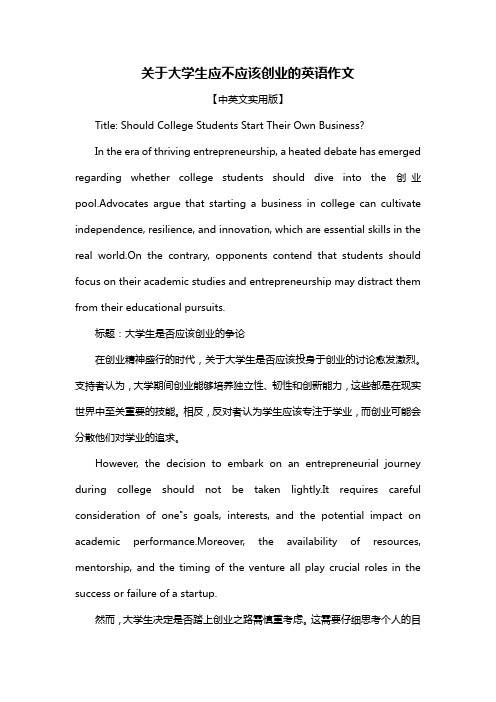
关于大学生应不应该创业的英语作文【中英文实用版】Title: Should College Students Start Their Own Business?In the era of thriving entrepreneurship, a heated debate has emerged regarding whether college students should dive into the创业pool.Advocates argue that starting a business in college can cultivate independence, resilience, and innovation, which are essential skills in the real world.On the contrary, opponents contend that students should focus on their academic studies and entrepreneurship may distract them from their educational pursuits.标题:大学生是否应该创业的争论在创业精神盛行的时代,关于大学生是否应该投身于创业的讨论愈发激烈。
支持者认为,大学期间创业能够培养独立性、韧性和创新能力,这些都是在现实世界中至关重要的技能。
相反,反对者认为学生应该专注于学业,而创业可能会分散他们对学业的追求。
However, the decision to embark on an entrepreneurial journey during college should not be taken lightly.It requires careful consideration of one"s goals, interests, and the potential impact on academic performance.Moreover, the availability of resources, mentorship, and the timing of the venture all play crucial roles in the success or failure of a startup.然而,大学生决定是否踏上创业之路需慎重考虑。
关于大学生应不应该创业的英语作文
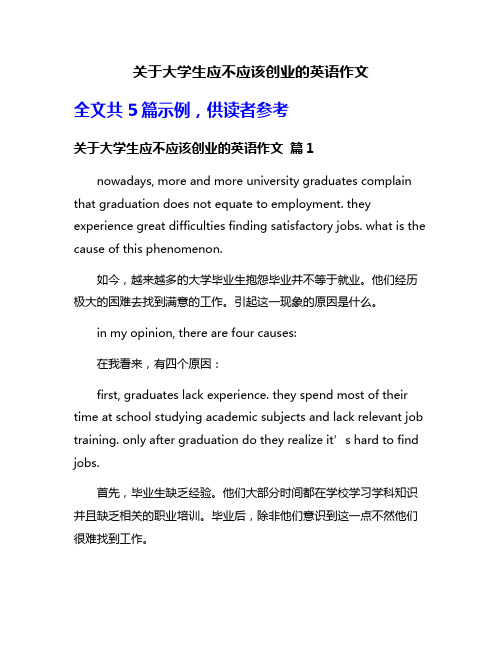
关于大学生应不应该创业的英语作文全文共5篇示例,供读者参考关于大学生应不应该创业的英语作文篇1nowadays, more and more university graduates complain that graduation does not equate to employment. they experience great difficulties finding satisfactory jobs. what is the cause of this phenomenon.如今,越来越多的大学毕业生抱怨毕业并不等于就业。
他们经历极大的困难去找到满意的工作。
引起这一现象的原因是什么。
in my opinion, there are four causes:在我看来,有四个原因:first, graduates lack experience. they spend most of their time at school studying academic subjects and lack relevant job training. only after graduation do they realize it’s hard to find jobs.首先,毕业生缺乏经验。
他们大部分时间都在学校学习学科知识并且缺乏相关的职业培训。
毕业后,除非他们意识到这一点不然他们很难找到工作。
second, competition among graduates grows more bitter and more bitter and bitter. the supply of university graduates exceeds social demand. this results in a decreased chance for any individual graduate to find a job.第二,毕业生之间的竞争日趋激烈。
大学英语作文:大学生应该创业吗?
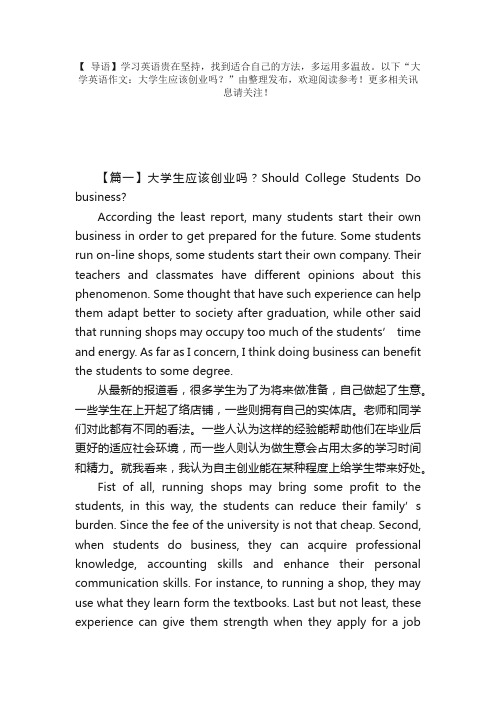
【导语】学习英语贵在坚持,找到适合自己的方法,多运用多温故。
以下“大学英语作文:大学生应该创业吗?”由整理发布,欢迎阅读参考!更多相关讯息请关注!【篇一】大学生应该创业吗?Should College Students Do business?According the least report, many students start their own business in order to get prepared for the future. Some students run on-line shops, some students start their own company. Their teachers and classmates have different opinions about this phenomenon. Some thought that have such experience can help them adapt better to society after graduation, while other said that running shops may occupy too much of the students’ time and energy. As far as I concern, I think doing business can benefit the students to some degree.从最新的报道看,很多学生为了为将来做准备,自己做起了生意。
一些学生在上开起了络店铺,一些则拥有自己的实体店。
老师和同学们对此都有不同的看法。
一些人认为这样的经验能帮助他们在毕业后更好的适应社会环境,而一些人则认为做生意会占用太多的学习时间和精力。
就我看来,我认为自主创业能在某种程度上给学生带来好处。
Fist of all, running shops may bring some profit to the students, in this way, the students can reduce their family’s burden. Since the fee of the university is not that cheap. Second, when students do business, they can acquire professional knowledge, accounting skills and enhance their personal communication skills. For instance, to running a shop, they may use what they learn form the textbooks. Last but not least, these experience can give them strength when they apply for a jobbecause they have related experience. By doing business with others, they can learn how to cooperate with others and become more competitive in the job market.首先,经营店铺可以为学生带来利润。
大学生要不要创业英语作文
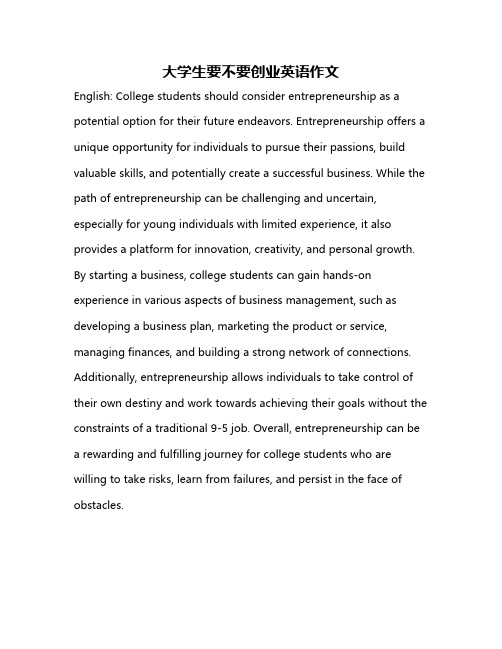
大学生要不要创业英语作文English: College students should consider entrepreneurship as a potential option for their future endeavors. Entrepreneurship offers a unique opportunity for individuals to pursue their passions, build valuable skills, and potentially create a successful business. While the path of entrepreneurship can be challenging and uncertain, especially for young individuals with limited experience, it also provides a platform for innovation, creativity, and personal growth. By starting a business, college students can gain hands-on experience in various aspects of business management, such as developing a business plan, marketing the product or service, managing finances, and building a strong network of connections. Additionally, entrepreneurship allows individuals to take control of their own destiny and work towards achieving their goals without the constraints of a traditional 9-5 job. Overall, entrepreneurship can be a rewarding and fulfilling journey for college students who are willing to take risks, learn from failures, and persist in the face of obstacles.Translated content: 大学生应该考虑创业作为未来探索的一个潜在选择。
大学生要不要创业英语作文
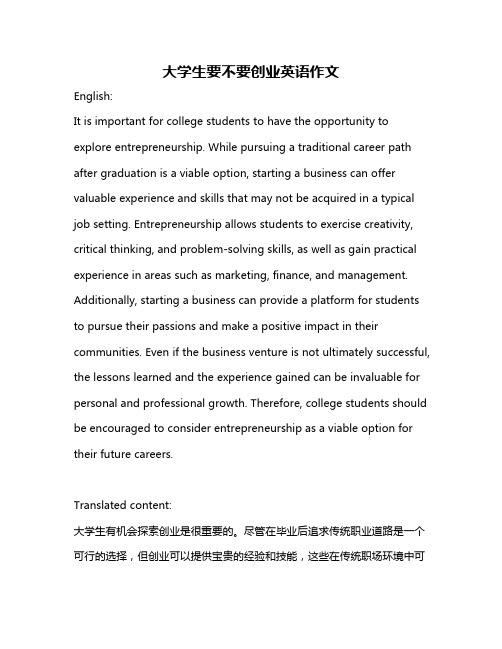
大学生要不要创业英语作文English:It is important for college students to have the opportunity to explore entrepreneurship. While pursuing a traditional career path after graduation is a viable option, starting a business can offer valuable experience and skills that may not be acquired in a typical job setting. Entrepreneurship allows students to exercise creativity, critical thinking, and problem-solving skills, as well as gain practical experience in areas such as marketing, finance, and management. Additionally, starting a business can provide a platform for students to pursue their passions and make a positive impact in their communities. Even if the business venture is not ultimately successful, the lessons learned and the experience gained can be invaluable for personal and professional growth. Therefore, college students should be encouraged to consider entrepreneurship as a viable option for their future careers.Translated content:大学生有机会探索创业是很重要的。
大学生要不要创业英语作文
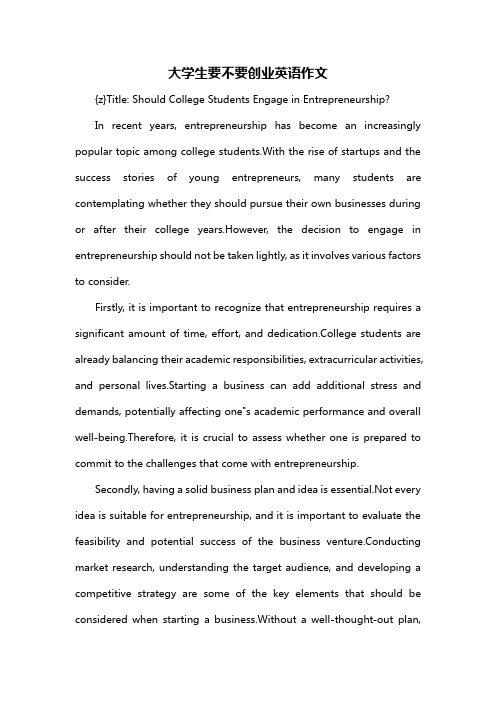
大学生要不要创业英语作文{z}Title: Should College Students Engage in Entrepreneurship?In recent years, entrepreneurship has become an increasingly popular topic among college students.With the rise of startups and the success stories of young entrepreneurs, many students are contemplating whether they should pursue their own businesses during or after their college years.However, the decision to engage in entrepreneurship should not be taken lightly, as it involves various factors to consider.Firstly, it is important to recognize that entrepreneurship requires a significant amount of time, effort, and dedication.College students are already balancing their academic responsibilities, extracurricular activities, and personal lives.Starting a business can add additional stress and demands, potentially affecting one"s academic performance and overall well-being.Therefore, it is crucial to assess whether one is prepared to commit to the challenges that come with entrepreneurship.Secondly, having a solid business plan and idea is essential.Not every idea is suitable for entrepreneurship, and it is important to evaluate the feasibility and potential success of the business venture.Conducting market research, understanding the target audience, and developing a competitive strategy are some of the key elements that should be considered when starting a business.Without a well-thought-out plan,the chances of failure are significantly higher.Furthermore, entrepreneurship also requires a certain level of financial stability.While there are various funding opportunities and investors available, it is important to have a financial backup plan in case the business does not generate the expected revenue.College students should carefully assess their financial situation and determine if they have the means to support their business endeavors.Moreover, entrepreneurship offers valuable learning opportunities that can contribute to personal and professional growth.It allows students to gain hands-on experience, develop problem-solving skills, and learn about various aspects of business management.Engaging in entrepreneurship can also expand one"s network and create connections that may be beneficial in the future.In conclusion, the decision to engage in entrepreneurship as a college student should be carefully considered.It requires dedication, a solid business plan, financial stability, and a willingness to learn.While entrepreneurship offers numerous opportunities for growth and development, it is important to prioritize one"s academic responsibilities and personal well-being.Ultimately, the choice depends on individual goals, aspirations, and circumstances.。
大学生要不要创业英语作文
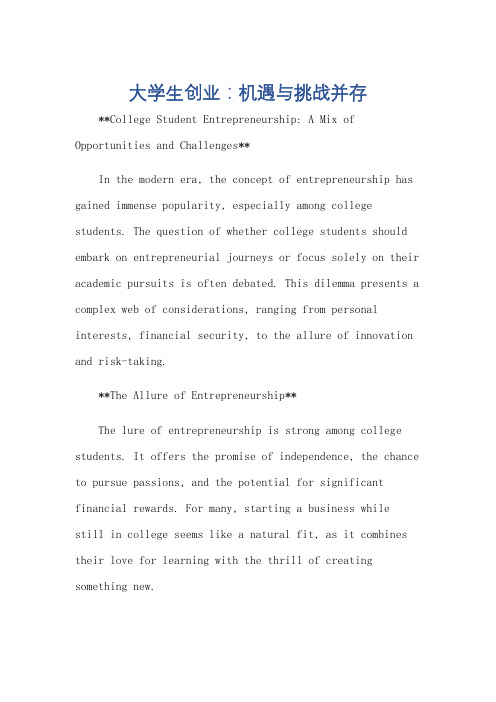
大学生创业:机遇与挑战并存**College Student Entrepreneurship: A Mix of Opportunities and Challenges**In the modern era, the concept of entrepreneurship has gained immense popularity, especially among college students. The question of whether college students should embark on entrepreneurial journeys or focus solely on their academic pursuits is often debated. This dilemma presents a complex web of considerations, ranging from personal interests, financial security, to the allure of innovation and risk-taking.**The Allure of Entrepreneurship**The lure of entrepreneurship is strong among college students. It offers the promise of independence, the chance to pursue passions, and the potential for significant financial rewards. For many, starting a business whilestill in college seems like a natural fit, as it combines their love for learning with the thrill of creating something new.Moreover, entrepreneurship provides a platform for students to apply their academic knowledge in real-world settings. This practical application not only enhancestheir learning experience but also prepares them for future career challenges. Additionally, it fosters creativity and problem-solving skills, which are invaluable assets in today's rapidly changing world.**Challenges of College Student Entrepreneurship**However, the road to entrepreneurship is not withoutits pitfalls. For college students, balancing academics with the demands of a startup can be challenging. Therigors of coursework, exams, and extracurricular activities can often leave little time for entrepreneurial pursuits. This can lead to compromised academic performance or even dropout rates if not managed effectively.Moreover, starting a business requires significant financial resources, which many college students may not have access to. Finding investors, managing cash flow, and dealing with financial uncertainties can be overwhelmingfor those who are still learning to manage their personal finances.**The Way Forward**So, what's the right path for college students? Should they embrace entrepreneurship or stick to their studies? The answer, in essence, lies in the individual's circumstances and aspirations.For those who are passionate about their ideas and have the necessary resources and support, entrepreneurship can be a rewarding experience. However, it's crucial to approach it with caution, ensuring that it does not compromise their academic pursuits. This might involve careful planning, seeking mentorship, and networking with like-minded individuals to gain valuable insights and support.On the other hand, for those who are not yet ready to take on the challenges of entrepreneurship, focusing on their studies can provide a solid foundation for future success. The knowledge and skills gained through higher education can open up a wide range of career opportunities, including those in corporate settings or government organizations.In conclusion, college student entrepreneurship offers both opportunities and challenges. Whether to embark onthis journey depends on the individual's readiness, resources, and aspirations. What's crucial is to make informed decisions that align with one's long-term goalsand ambitions.**大学生创业:机遇与挑战并存**在现代社会,创业的概念已经变得非常流行,特别是在大学生中。
大学生是否应该尝试创业英语作文
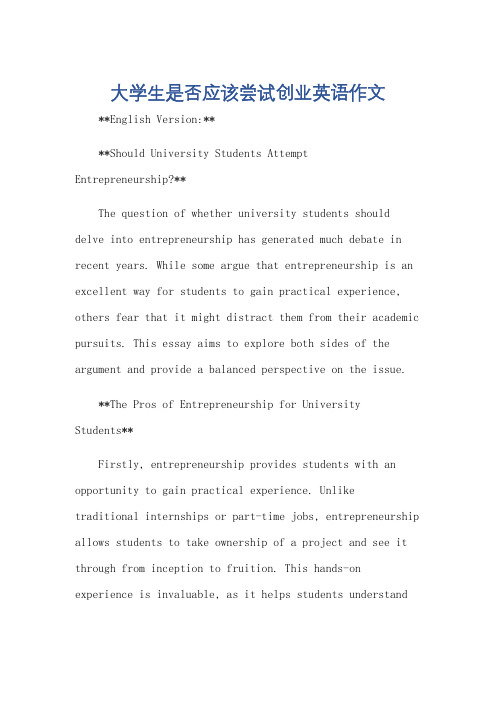
大学生是否应该尝试创业英语作文**English Version:****Should University Students Attempt Entrepreneurship?**The question of whether university students should delve into entrepreneurship has generated much debate in recent years. While some argue that entrepreneurship is an excellent way for students to gain practical experience, others fear that it might distract them from their academic pursuits. This essay aims to explore both sides of the argument and provide a balanced perspective on the issue. **The Pros of Entrepreneurship for UniversityStudents**Firstly, entrepreneurship provides students with an opportunity to gain practical experience. Unliketraditional internships or part-time jobs, entrepreneurship allows students to take ownership of a project and see it through from inception to fruition. This hands-on experience is invaluable, as it helps students understandthe real-world challenges of running a business and managing a team.Secondly, entrepreneurship can foster creativity and innovation. University students are often full of ideas and energy, and entrepreneurship provides them with a platformto turn their ideas into reality. This creative process not only helps students develop their skills but alsocultivates a culture of innovation that is crucial for economic growth and societal progress.Lastly, entrepreneurship can provide financial benefits. While starting a business is risky, it can also be highly rewarding. Successful entrepreneurs not only generate income for themselves but also create job opportunities for others. This financial reward can be a strong incentive for students to pursue entrepreneurship.**The Cons of Entrepreneurship for UniversityStudents**Firstly, entrepreneurship can be a significantdistraction from academic pursuits. University is a timefor students to focus on their studies and develop their academic skills. Engaging in entrepreneurship may requirestudents to divide their attention between their studies and their business, potentially affecting their academic performance.Secondly, entrepreneurship involves significant financial and emotional risks. Starting a business is expensive, and there is no guarantee of success. If a business fails, students may lose not only their investment but also their time and energy. This emotional toll can be difficult to bear, especially for young students who are still developing their resilience.Lastly, entrepreneurship requires a significant amount of time and effort. Running a business is a demanding task that requires constant attention and dedication. This can be challenging for students who are also trying to balance their academic workload and social life.**Conclusion**In conclusion, while entrepreneurship can provide valuable practical experience, creativity, and financial benefits to university students, it also involves significant risks and distractions. Therefore, students should carefully consider their goals and priorities beforedeciding whether to pursue entrepreneurship. For those who are interested in entrepreneurship, it is advisable tostart small and focus on balancing their academic and entrepreneurial pursuits. By doing so, they can ensure that they do not compromise their academic performance whilestill gaining valuable practical experience.**Chinese Version:****大学生是否应该尝试创业?**近年来,大学生是否应该涉足创业的问题引发了广泛的讨论。
大学生毕业后要不要创业英语作文
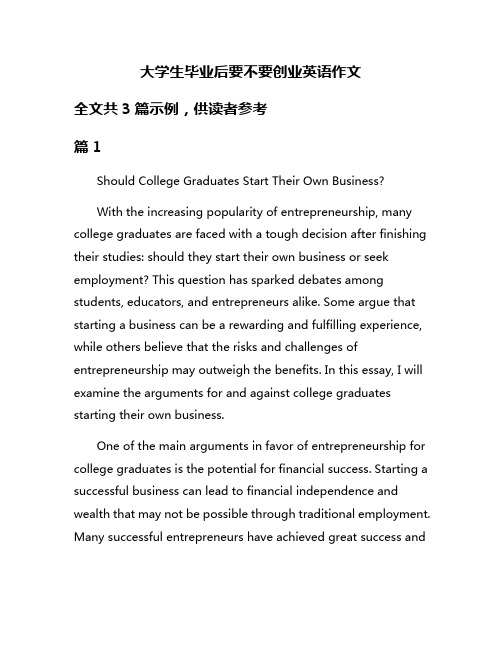
大学生毕业后要不要创业英语作文全文共3篇示例,供读者参考篇1Should College Graduates Start Their Own Business?With the increasing popularity of entrepreneurship, many college graduates are faced with a tough decision after finishing their studies: should they start their own business or seek employment? This question has sparked debates among students, educators, and entrepreneurs alike. Some argue that starting a business can be a rewarding and fulfilling experience, while others believe that the risks and challenges of entrepreneurship may outweigh the benefits. In this essay, I will examine the arguments for and against college graduates starting their own business.One of the main arguments in favor of entrepreneurship for college graduates is the potential for financial success. Starting a successful business can lead to financial independence and wealth that may not be possible through traditional employment. Many successful entrepreneurs have achieved great success andwealth through their ventures, inspiring others to take the risk of starting their own businesses.In addition to financial rewards, entrepreneurship also offers the opportunity for personal growth and development. Running a business requires individuals to take on new challenges, make difficult decisions, and learn from their successes and failures. This can help college graduates to develop important skills such as communication, leadership, and problem-solving, which can be valuable in any career.Furthermore, starting a business can allow college graduates to pursue their passions and interests. Unlike traditional employment, entrepreneurship provides individuals with the freedom to build a business around something they are passionate about. This can lead to greater job satisfaction and fulfillment, as individuals are able to work on projects that are meaningful to them.On the other hand, there are numerous challenges and risks associated with starting a business that may deter college graduates from pursuing entrepreneurship. One of the main challenges is the high failure rate of new businesses. According to research, a large percentage of new businesses fail within thefirst few years of operation due to factors such as lack of funding, market competition, and poor management.Another challenge for college graduates starting a business is the lack of experience and knowledge in running a company. Unlike seasoned entrepreneurs who have years of experience and expertise, college graduates may lack the necessary skills and resources to successfully start and grow a business. This can make it difficult for them to compete in the market and attract customers, investors, and employees.Furthermore, entrepreneurship can be a risky and stressful endeavor that may not be suitable for everyone. Starting a business requires individuals to take on significant financial risks, work long hours, and deal with uncertainty and setbacks. This can take a toll on one's mental and physical health, leading to burnout and exhaustion.In conclusion, the decision of whether college graduates should start their own business is a complex and personal one that depends on individual circumstances, goals, and preferences. While entrepreneurship can offer financial rewards, personal growth, and the opportunity to pursue one's passions, it also comes with challenges and risks that may not be suitable for everyone. Ultimately, college graduates should carefullyconsider their options and seek guidance from mentors, advisors, and entrepreneurs before making a decision to start their own business.篇2Should College Graduates Start their Own Businesses?Nowadays, with the rapid development of the economy and the increasing competition in the job market, many college graduates are facing a choice after graduation - whether to start their own businesses or to find a stable job. There is no doubt that starting a business is a risky move, but it also has its own advantages. In this essay, we will discuss the pros and cons of college graduates starting their own businesses.Firstly, let's talk about the advantages of starting a business. One of the biggest benefits of entrepreneurship is the freedom and flexibility it provides. As a business owner, you have the freedom to make your own decisions and create your own schedule. You can choose your own working hours, set your own goals, and pursue your passion. Moreover, starting a business can also bring financial rewards. If your business is successful, you have the potential to earn a much higher income than if you were working for someone else. In addition, starting a businesscan also give you a sense of accomplishment and pride. Building a successful business from scratch is a challenging task, but it can be extremely rewarding.On the other hand, starting a business also comes with its own set of challenges. One of the main drawbacks of entrepreneurship is the risk involved. Starting a business is a risky venture, and there is always a chance that your business will fail. In addition, starting a business requires a lot of hard work, dedication, and perseverance. You will need to invest a significant amount of time and effort into building and growing your business. Moreover, starting a business can also be stressful and overwhelming. As a business owner, you will be responsible for every aspect of your business, from marketing and sales to finance and operations. This can be a lot of pressure for some people.In conclusion, whether college graduates should start their own businesses or not depends on their individual circumstances and goals. Entrepreneurship can be a rewarding and fulfilling experience, but it is not for everyone. It requires a lot of hard work, dedication, and perseverance. If you are passionate about starting your own business and willing to take on the challenges that come with it, then entrepreneurship may be the right choicefor you. However, if you prefer a stable and secure job, then it may be better to work for someone else. Ultimately, the decision to start a business should be based on your personal strengths, interests, and goals.篇3Should College Graduates Start Their Own Business?After college graduation, one of the big decisions that many students face is whether to start their own business or to join an established company. This dilemma can be daunting, as it involves weighing the risks and rewards of entrepreneurship against the security and stability of a traditional job. In this essay, we will explore the arguments for and against starting a business after college.On one hand, starting a business can be a rewarding and fulfilling experience. Many college graduates are filled with creative ideas and entrepreneurial spirit, and starting their own business allows them to pursue their passions and make a meaningful impact on the world. In addition, entrepreneurship can provide a sense of independence and autonomy that is hard to find in a corporate job, as well as the potential for financial success and wealth creation.On the other hand, starting a business is not without its challenges. Entrepreneurship requires a high level of commitment, hard work, and perseverance, as well as a willingness to take risks and face uncertainty. Many new businesses fail within the first few years, and the road to success can be long and arduous. In addition, starting a business often requires a significant investment of time, energy, and money, which may be difficult for recent college graduates who are already burdened with student loan debt.In conclusion, the decision of whether to start a business after college is a personal one that depends on a variety of factors, including individual goals, values, and circumstances. While entrepreneurship can be a rewarding and fulfilling path, it is not for everyone, and there is no one-size-fits-all answer. Ultimately, college graduates should carefully weigh the risks and rewards of entrepreneurship and make an informed decision that aligns with their own aspirations and ambitions.。
大学生应该自己创业吗英语作文100字

大学生应该自己创业吗英语作文100字全文共6篇示例,供读者参考篇1Should College Kids Start Their Own Businesses? An Essay by a 3rd GraderHiya! My name is Timmy and I'm in 3rd grade. My teacher Mrs. Hutchins asked us to write about if we think college kids should start their own businesses. At first I was like "Huh? What's a college kid?" But then she explained it's those really old teens that go to special schools called "coll-ege" after high school.I don't really know much about college or businesses, but I'll tell you what I think! Starting a business seems super hard. My dad owns a small business fixing cars and he's always stressed out about money, paying his employees, and keeping customers happy. It looks like a ton of work!But then again, maybe college kids would be good at running businesses since they're so old and smart after going to all those years of school? Though I guess they're still pretty young. like maybe 19 or 20 years old? That's basically a kid still if you ask me!Either way, I think it would be really really hard to start a business while also going to college classes and doing college kid stuff like parties and ultimate frisbee club. My teenage cousins say college is crazy busy already with tons of homework, papers, group projects, and studying. Where would they even find the time to run a whole business too? Their brains would probably melt!Though I suppose if the business was really small and simple, like a lemonade stand or walking dogs, then maybe it could work. As long as it didn't distract too much from their school work. Education comes first after all! Didn't somebody famous say "The more you learn, the more you earn?" So focus on getting good grades first before trying to make your mill-yuns!But then again, maybe starting a small business could teach college kids super valuable skills that don't get covered in classrooms? Like about money, taxes, managing people, marketing, and all that grown-up stuff. They'd get real-world experience instead of just book learning. That could make them way ahead of their peers once they graduate! Talk about a head start on life.Who knows, maybe their little business could turn into the next Google or Amazon one day? How cool would it be for somescraggly college kid to become a bazillionaire by the time they're 25?? That's like the dream, right? Though I guess the odds are really really slim. Safer to just get a normal job out of college probably.In the end, I don't know if I'd recommend most college kids start their own business. It seems crazy difficult to juggle all that plus classes. But for a few special entrepreneur-types who are really really passionate and worked super hard, maybe it could work? As long as they're careful, get plenty of support, and don't go broke and flunk out! Yikes, no thanks!Anywhoozle, that's my 3rd grade perspective on the whole "should college kids start businesses" thing. Hopefully I don't get too bad a grade - I did warn you this would be a super basic kid's view! Let me know if you need any more papers written from the mind of a 8-year-old genius. I'll even spotchya a discount, 2 for 1 low low price! Until next time, lecce money-bee!篇2Should College Kids Start Their Own Businesses? An Essay by a 2nd GraderHi everyone! My name is Jamie and I'm 8 years old. My teacher Mrs. Robinson asked us to write about whether we thinkcollege students should try to start their own businesses instead of getting a regular job after graduation. I've been thinking a lot about this because my older brother Jason is going to college next year.I asked my parents what they think first. Mom said "Starting your own business can be really hard work, but it allows you to be your own boss and keep all the profits for yourself instead of working for someone else's company." Dad added "It's very risky too though. Most new businesses fail within the first few years. You have to invest a lot of your own money and time."After talking to them, I can see there are some good points on both sides. On one hand, having your own business sounds exciting! You get to make all the decisions and choose what kinds of products or services to offer. If it's successful, you can make a lot of money. Plus you don't have to listen to a mean boss telling you what to do all day. My friend Tyler's dad owns a pizza restaurant and Tyler says he gets free pizza anytime he wants!On the other hand, my parents are right that it's really hard work and pretty risky. You might put in a ton of effort and money into starting a business just for it to fail. Then you're out of a job and broke! Most kids in college are pretty broke already with allthose student loans to pay back. It's probably smarter and safer to just get a regular job when you graduate.Another thing to think about is what kind of business the college kid wants to start. Some businesses are easier than others. Like if you want to start a lawn mowing business, you really just need to buy some secondhand mowers and other equipment. Or a tutoring business where you just need some textbooks. Those are way easier than opening up a real store or restaurant which require a lot more money upfront.My brother Jason isn't really a risk-taker though. Our neighbor Mr. Davis ran a bike shop for 20 years before retiring, and he told Jason that the first 5 years were incredibly stressful as he struggled to attract customers and make enough money to keep the shop open. Jason gets pretty anxious about stuff like that. For someone like him who wants a stable, predictable career, it's probably better to take a regular job at first. Maybe he could start a small side business in a few years once he has some savings built up.For other students who are more adventurous and willing to take risks, I can see how starting their own business right out of college could make sense. Especially if they have an amazing business idea they are really passionate about. My friendMeghan's sister graduated last year and immediately started an online clothing boutique for plus-size women. She worked insanely long hours that first year but says it was worth it because the business is now successful and profitable.So I guess my conclusion is: it depends on the person and the business idea. For some students, self-employment is the dream and they should absolutely go for it if they have the skills, resources, and risk tolerance. But for others, it's better to start with a normal 9-to-5 career. There's no single right answer.Personally, when I grow up I want to be a marine biologist and study whale sharks. That's a pretty clear career path of getting a university degree and then a job at an aquarium or research institution. No plans to start a business for me! But who knows, maybe in 20 years I'll open my own whale shark ecotourism company or something. An 8-year-old can dream!Anyway, those are just my thoughts based on what I've observed so far. What do you all think - should college grads try their hand at entrepreneurship or stick to a safer career path? Let me know!篇3Should University Students Start Their Own Businesses?An Essay by little Timmy, Age 8Hi everyone! Timmy here with a big essay all about university students and businesses. It's a really important topic that even kids like me should learn about. Are you ready? Here we go!First of all, what even is a university student? Well, they are really old kids, like maybe 18 or 19 or even 20 years old! Can you believe how old that is? I'm only 8 so university students seem like grown-ups to me. Anyway, they go to university to learn lots of super hard stuff after finishing regular school.And what about a business? A business is like when you sell things or do a job to make money. My dad has a business where he cuts people's grass and shovels snow in the winter. My mom has a business too where she buys and sells things online. So a business is how grown-ups get money to buy foods and toys and pay for their house and car and everything.Now, the big question is - should those university student grown-ups start their own businesses while they are still students? Hmmmm, it's a hard one! Let me think about the good reasons why they should and the bad reasons why they shouldn't.OK, here are some good reasons why university students should definitely start a business:They can make money! University is really expensive with all the fees and books and stuff. If they start a business, they can get money to help pay for everything. That's really smart.They can learn awesome skills. Running a business helps you learn how to talk to people, solve problems, manage money, and be responsible. Those are all skills that will help them get a job after university.It's good practice. OMG, spelling practice again! Just kidding! What I mean is, it's good practice for the future when they might want to run a bigger business after graduating. Better to start small first as students.They have free time. University students don't have school all day every day like me. They have big gaps in between classes. That's the perfect time to work on a little business!They're young and energetic. Students are young with lots of energy to work hard on their business. It's easier than waiting until they are really old and tired.Those are some really amazing reasons to start a business in university. Go students, go! But....there are also somenot-so-good reasons why they shouldn't start businesses. Let me tell you those reasons too:It can distract from studies. Running a business takes a lot of work and time. If students spend too much time on their business, they might not do a good job in their classes and fail university. That would be terrible!They don't have much money. Most students don't have a ton of money saved up to invest in starting a business. You usually need some money at the beginning to buy supplies and stuff. No money makes it hard.It's very stressful. Between all their classes, homework, jobs, friends, etc. university students already have a lot of stress. Adding the stress of a whole business could make them super duper stressed out. Yikes!They have no experience. Students are still pretty young and new to the world. They don't have a lot of job or business experience yet. That makes it extra challenging to successfully run a business.What if it fails? Most new small businesses started by anyone (not just students) end up failing in the first year or two. If a student's business fails, it could hurt their confidence and finances.Hmmmm...those are a lot of good and bad reasons, don't you think? It's such a hard choice! If I think about it like a kid, I would say students should just focus on their studies and enjoy being a student for now. Starting a business seems like an awful lot of stress and work on top of everything else.篇4Should College Kids Start Their Own Businesses?Hi there! My name is Jamie and I'm 8 years old. My teacher Ms. Martin asked us to write about whether we think college students should try to start their own companies instead of getting a regular job after graduating. It's a really interesting question!I've been thinking about it a lot. On one hand, starting your own business seems like it could be really cool and exciting. You get to be your own boss and come up with your own ideas for products or services that people want. If your business takes off, you could end up being really successful and making a ton of money. How awesome would that be?But then again, it also seems really really hard and risky to start a whole company all by yourself when you're just out of college. Most businesses fail, especially at first when they're justgetting started. You have to put in a crazy amount of work and time. And what if you run out of money before your business makes any profit? Then you're broke and have to get a job anyway.My dad tried starting his own businesses a couple times after he graduated from college and it was always really stressful for my family. We never had much money and he was constantly worrying about making payroll or finding investors or marketing his products. Eventually he gave up and got a regular job, which he still has now. I remember him saying how much easier it was once he got that job and didn't have to deal with the ups and downs of his business anymore.On the other hand, I have a friend whose mom is an entrepreneur and she owns her own little bakery downtown. It's been crazy successful and my friend says his mom just loves running her own business and being in charge of everything. She's made tons of money from it too. So I guess it can work out really well if you have a great idea and work really really hard.There's also lots of famous business owners who started their companies when they were in college or right after graduating, like Mark Zuckerberg with Facebook or Steve Jobs with Apple. They were definitely very smart and probably a littlelucky too. But look how it turned out for them! They're billionaires.So I can see arguments on both sides. Starting your own business could be an amazing, life-changing opportunity if you really devote yourself to it and it takes off. But it's also incredibly difficult and risky, with a very high chance of failure that could leave you broke or in debt.Personally, I don't think I'd want to start a business right out of college unless I had an absolutely brilliant, million-dollar idea that I just knew would be a huge success. Otherwise, I think I'd probably want the safety and stability of getting a normal job first after graduation. Once I had some work experience and savings built up, then maybe I could try starting a little business on the side to supplement my income. If it was doing well after a few years, then potentially I could quit my job and take the leap into running the business full-time.But who knows, maybe by the time I get to college I'll be a risk-taking entrepreneur who wants to launch a startup right away! A lot can change in 10+ years. For now though, I lean towards playing it safe after college rather than jumping straight into the chaos and uncertainty of starting a whole company.Getting a regular job and establishing myself first seems a bit wiser to me at this point.What do you think? Should college grads immediately try to start their own businesses? Or is it smarter to get some normal work experience first before potentially branching out as an entrepreneur later on? I'd love to hear your perspective! Let me know.篇5Should College Kids Start Their Own Businesses?Hi everyone! My name is Billy and I'm 8 years old. My teacher Mrs. Johnson asked us to write about whether we think college students should try to start their own companies instead of getting a regular job after graduation. It's a very grown-up topic but I'll do my best!First off, what even is a college student? From what I understand, they are people a little older than my teenage brother who go to a special school called a college or university after finishing high school. College is where you learn about really advanced subjects and prepare for different career paths. Starting your own business means creating a brand newcompany from scratch and being the boss instead of working for someone else.In my opinion, I think college students definitely should try to start their own businesses if they have a great idea and are really passionate about it. Having your own company means you get to be in charge and make all the important decisions. You don't have to listen to a mean boss telling you what to do all day long. If your business is successful, you can make a ton of money and never have to work for anyone else again! How awesome would that be?However, starting a business is also very risky and difficult, especially when you are still a young student. My dad tried running his own little shop for a few years after college but it didn't work out. He had to get a regular job in the end because his business wasn't making enough money. From what he told me, you need a really innovative product or service that people actually want to buy. You also need a good business plan and enough money saved up to keep the company going for a while until it starts profiting.A lot of students don't have much money since college is already so expensive with tuition, textbooks, housing and everything. It's probably smarter to just focus on getting goodgrades and finishing your degree rather than dividing your attention between school and a start-up. After graduating, you could get some real work experience at an existing company first before trying to start your own business down the road when you have more skills and savings built up.On the other hand, some of the most famous entrepreneurs like Mark Zuckerberg and Bill Gates were just college kids when they launched their world-changing companies from a dorm room. Facebook, Microsoft, Google, Yahoo and many others all started as tiny student projects before becoming corporate giants. So it's certainly possible to achieve incredible success straight out of university if you have the next billion-dollar idea!In my opinion though, those are the rare exceptions rather than the rule. For every mega start-up, there are probably thousands that fizzle out after a year or two. Starting a business is just as legitimate a career path as anything else, but it's also much riskier and challenging than getting a normal 9-to-5 job, especially early on.My advice for college students would be to only seriously pursue starting a company if you have a completely revolutionary product or service that you are 100% passionate about and confident in. Otherwise, it's better to focus on yourstudies, do internships to gain experience, and then get your foot in the door at an established company after graduation. Work hard, learn as much as you can, and start saving up money. Then, after you've developed some real expertise and have enough savings to support yourself, you can re-evaluate and decide if you want to take the risk of starting your own business. But don't do it fresh out of college unless you have that million-dollar idea!Those are just my thoughts as an 8-year-old though. What do you all think? Should college kids try to become the next big entrepreneurs? Or is it smarter to stick to the corporate path early on? I'd love to hear your perspectives! Let me know in the comments below.Thanks for reading my essay! I worked really hard on making it long and using lots of big words, just like Mrs. Johnson asked. Hopefully I helped explain this very grown-up topic properly. Time for some video games!篇6Should College Kids Start Their Own Businesses? An Essay by Timmy (Age 8)Hi! My name is Timmy and I'm 8 years old. My teacher Mrs. Martin asked us to write about if we think college kids should start their own businesses. I think it's a really interesting question!College is when you go to a big school after high school to learn stuff to help you get a job one day. My older brother Bobby is in college right now and he's studying engineeringering - that's about building bridges and cars and stuff. He has to go to a lot of classes and do a ton of homework. It seems really hard!A business is when you sell products or services to make money. Like the grocery store by my house is a business that sells food. And the landscaper that mows my neighbor's lawn runs a business too by providing a lawn mowing service. To start your own business, you need to come up with an idea for what to sell or do. Then you have to get money saved up to buy supplies and equipment. And you probably need a building or store to operate out of too. It's a lot of work!So should college kids who already have a lot of schoolwork start their own business on top of that? I go back and forth on whether it's a good idea. Here are some of the pros and cons I can think of:Pros of College Kids Starting a Business:They're young and have lots of energy and time. College kids don't have kids of their own yet, so they have more free time than older adults who have families to take care of. They can put in long hours to get their business off the ground becausethey're not as tired.They can learn entrepreneurship skills. Entrepreneurship is a fancy word for running your own business. If college kids start a small business, they'll learn how to market products, manage money, deal with customers, and all the other stuff entrepreneurs have to do. Those could be really useful skills to have later in life when they're older!They can make money for college. College is really expensive - my parents are always complaining about how much they have to pay for Bobby's tuition and housing and meals and books and everything. If college kids start a successful little business, they could use the profits to pay for some of their college costs. That would make their parents really happy I bet!There's less risk than when you're older. College kids don't have a spouse or kids depending on their income yet. And they probably don't own a house or have a bunch of debt piled up. That means if their business totally failed, they wouldn't lose asmuch money as an older adult business owner. It's less risk because they have less to lose.Cons of College Kids Starting a Business:It could distract from classes and grades. With all the homework and studying and extra-curriculars, college is really time-consuming! Adding a whole business to run on top of that seems like wayyyy too much. It could cause college kids' grades to slip if they're spending too much time on their business instead of their schoolwork.They might not be ready. Most college kids have never had a real job before, let alone run an entire business! There's a lot to learn like accounting, taxes, hiring employees, and more. It might be smarter to get more life experience by having a job first before trying to start their own business.It's really hard and stressful. From what I've heard, being an entrepreneur and starting your own company is one of the most difficult things you can do. You have to put in insanely long hours, deal with a million different problems every day, and you might not even make any money for a long time! That sounds way too stressful for college kids who are just trying to go to parties and have fun.Lack of funds and credit. Most college kids don't have a lot of money saved up to invest in a new business. And if you have no credit history, it's really hard to get a loan from a bank. Having no money to get started is a huge obstacle when trying to launch a new business venture.So those are some of the biggest pros and cons as I see them! If I had to choose, I think I lean towards saying that most college kids probably shouldn't try to start their own full-fledged business. It seems like itWOULD be way too much on their plate with all their other academic responsibilities. And the risks of failing seem too high compared to waiting until after college to start a business.However, I do think it could make sense for some highly motivated and hardworking college kids to try starting a small, simple business on the side. Like, if you can think of an easy online business you can run from your laptop in your free time, that could be okay. Or maybe a little tutoring company or a small Etsy shop selling crafts or something. Just a teeny tiny business to start getting some entrepreneurial experience without going totally overboard.But launching a real actual company with a storefront and employees and everything? That seems wayyyy too much for acollege student to take on. You're young and you should enjoy those college years as much as you can! There will be plenty of time to stress about running a business after you graduate. Just my two cents!Okay, I think that's everything I wanted to say. Thanks for reading my essay! I worked really hard on making sure I covered both sides of the issue and gave good reasons for each perspective. Hopefully it made sense! Time for me to go play some video games now. Bye!。
大学生毕业后要不要创业英语作文
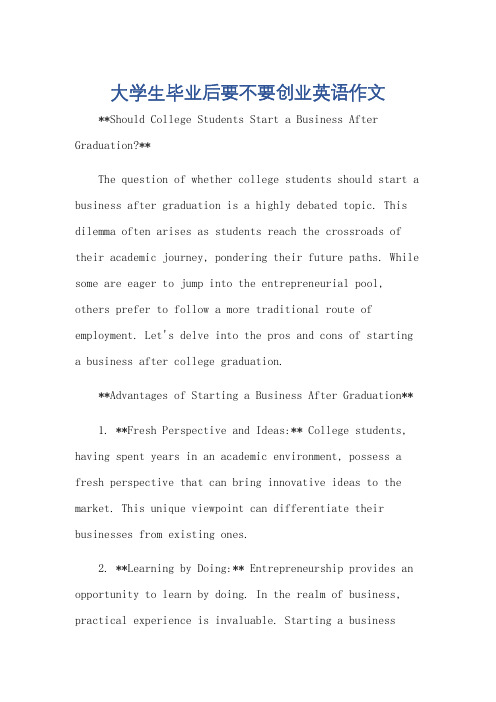
大学生毕业后要不要创业英语作文**Should College Students Start a Business After Graduation?**The question of whether college students should start a business after graduation is a highly debated topic. This dilemma often arises as students reach the crossroads of their academic journey, pondering their future paths. While some are eager to jump into the entrepreneurial pool, others prefer to follow a more traditional route of employment. Let's delve into the pros and cons of starting a business after college graduation.**Advantages of Starting a Business After Graduation** 1. **Fresh Perspective and Ideas:** College students, having spent years in an academic environment, possess a fresh perspective that can bring innovative ideas to the market. This unique viewpoint can differentiate their businesses from existing ones.2. **Learning by Doing:** Entrepreneurship provides an opportunity to learn by doing. In the realm of business, practical experience is invaluable. Starting a businessallows students to apply their theoretical knowledge inreal-world situations, gaining hands-on experience.3. **Fulfillment and Passion:** For those passionate about their ideas or products, starting a business can be a fulfilling experience. It allows them to pursue their passions and create something meaningful.4. **Financial Reward Potential:** While entrepreneurship is risky, it also offers the potential for significant financial rewards. Successful businesses can lead to significant profits and personal growth.**Disadvantages of Starting a Business After Graduation**1. **Risk and Uncertainty:** Entrepreneurship is inherently risky. Starting a business involves uncertainty, and the failure rate is high. This risk can be daunting for recent graduates.2. **Lack of Resources:** College students often lack the necessary resources to start a business, such as capital, network, and expertise. These resources arecrucial for business success.3. **Time and Effort:** Running a business is a demanding task that requires significant time and effort. It can be challenging for graduates to balance their entrepreneurial pursuits with other life responsibilities.4. **Competition:** The business world is competitive, and new startups often face stiff competition from established players. This competition can make it difficult for new businesses to survive.**Balancing the Pros and Cons**The decision to start a business after college graduation should be carefully weighed against personal goals, interests, and risk tolerance. Graduates should consider their long-term career plans and whether entrepreneurship aligns with those plans.For those interested in entrepreneurship, there are ways to mitigate the risks. Graduates can seek mentorship or advisory services from experienced entrepreneurs. They can also participate in incubators or accelerators to gain access to resources and networks.In conclusion, starting a business after college graduation is a choice that requires careful consideration. While it offers the potential for significant rewards, it also involves significant risks. Graduates should assess their goals, interests, and resources to make an informed decision that aligns with their long-term career plans.**大学生创业:机遇与挑战并存的选择**大学毕业后,大学生是否应该创业,这是一个备受争议的话题。
大学生是否应该尝试创业英语作文
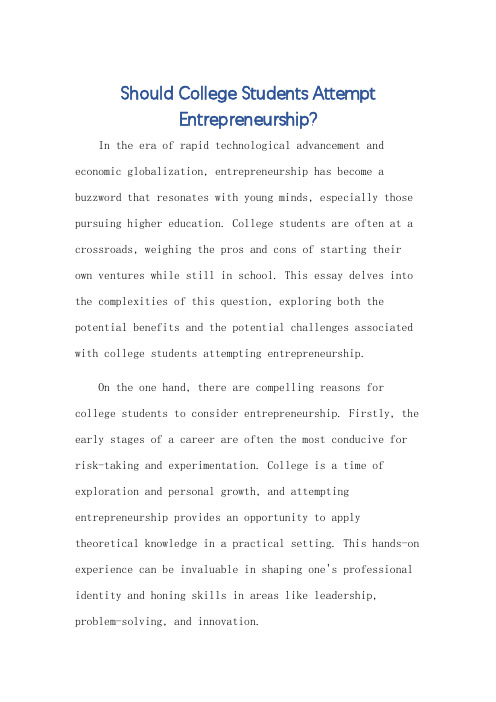
Should College Students AttemptEntrepreneurship?In the era of rapid technological advancement and economic globalization, entrepreneurship has become a buzzword that resonates with young minds, especially those pursuing higher education. College students are often at a crossroads, weighing the pros and cons of starting their own ventures while still in school. This essay delves into the complexities of this question, exploring both the potential benefits and the potential challenges associated with college students attempting entrepreneurship.On the one hand, there are compelling reasons for college students to consider entrepreneurship. Firstly, the early stages of a career are often the most conducive for risk-taking and experimentation. College is a time of exploration and personal growth, and attempting entrepreneurship provides an opportunity to apply theoretical knowledge in a practical setting. This hands-on experience can be invaluable in shaping one's professional identity and honing skills in areas like leadership, problem-solving, and innovation.Moreover, the college environment itself offers afertile ground for entrepreneurship. Universities oftenhave incubation centers, mentors, and networks that provide support and guidance to aspiring entrepreneurs. These resources can help students navigate the complexities of starting a business, from developing a business plan to seeking funding. Additionally, the collaborative nature of the academic community encourages students to work together, pooling their ideas and talents to create innovative solutions.However, the decision to pursue entrepreneurship during college is not without its challenges. Balancing academic responsibilities with the demands of a startup can be challenging. The time commitment required to launch and nurture a business can be significant, potentially compromising one's academic performance. Furthermore, the financial risks associated with entrepreneurship can be steep, especially for students who may not have a stable source of income or savings.Moreover, the success rate of startups is notoriously low, and the failure of a business can have significantemotional and psychological consequences. College students may not have the resilience or the coping mechanisms to deal with the stress and disappointment that often accompany failed entrepreneurial ventures.It is also worth noting that entrepreneurship is notfor everyone. While some students may possess the necessary skills and passions to become successful entrepreneurs, others may find their true calling in other fields. The decision to pursue entrepreneurship should be based on an honest assessment of one's interests, abilities, and risk tolerance.In conclusion, the question of whether college students should attempt entrepreneurship is not a straightforward one. While the potential benefits of entrepreneurship are significant, they must be weighed against the potential challenges and risks involved. College students should carefully consider their personal circumstances, goals, and capabilities before making the decision to pursue entrepreneurship. It is important to remember that entrepreneurship is not the only path to success, and thereare many other ways to achieve personal and professional fulfillment during college and beyond.**大学生是否应该尝试创业?**在科技迅猛发展和经济全球化的时代背景下,创业已成为年轻人心中的热门词汇,尤其对于那些接受高等教育的大学生而言。
大学生是否该创业英语作文
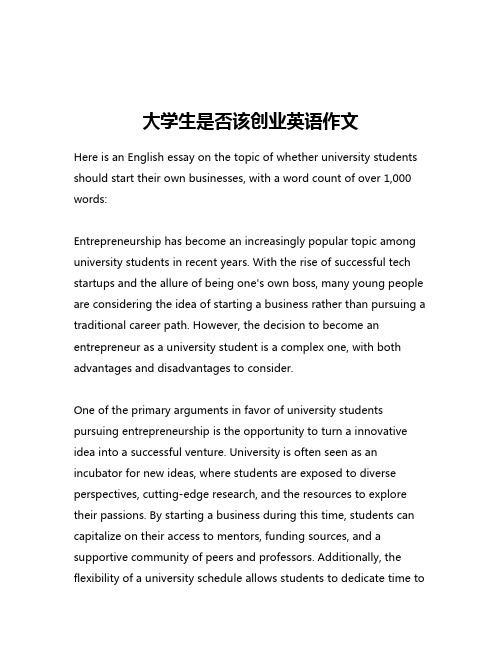
大学生是否该创业英语作文Here is an English essay on the topic of whether university students should start their own businesses, with a word count of over 1,000 words:Entrepreneurship has become an increasingly popular topic among university students in recent years. With the rise of successful tech startups and the allure of being one's own boss, many young people are considering the idea of starting a business rather than pursuing a traditional career path. However, the decision to become an entrepreneur as a university student is a complex one, with both advantages and disadvantages to consider.One of the primary arguments in favor of university students pursuing entrepreneurship is the opportunity to turn a innovative idea into a successful venture. University is often seen as an incubator for new ideas, where students are exposed to diverse perspectives, cutting-edge research, and the resources to explore their passions. By starting a business during this time, students can capitalize on their access to mentors, funding sources, and a supportive community of peers and professors. Additionally, the flexibility of a university schedule allows students to dedicate time todeveloping their business idea without the constraints of a full-time job.Moreover, entrepreneurship can provide university students with valuable real-world experience that may not be attainable through traditional internships or entry-level positions. Running a business requires a wide range of skills, including financial management, marketing, strategic planning, and problem-solving. These skills are highly sought after by employers, and the experience of starting a company can give students a competitive edge in the job market, should they choose to pursue a more traditional career path in the future.Additionally, successful entrepreneurship can lead to significant financial rewards. While the initial investment and risk-taking required to start a business are substantial, the potential for high returns can be enticing for university students, particularly those facing the prospect of significant student loan debt upon graduation. The ability to be financially independent and potentially create wealth through one's own efforts can be a powerful motivator for aspiring entrepreneurs.However, there are also significant challenges and risks associated with university students pursuing entrepreneurship. The demands of running a business can be immensely time-consuming and stressful,potentially distracting students from their academic studies and leading to diminished performance in the classroom. The high failure rate of startups also means that many student entrepreneurs may not achieve the success they had envisioned, leaving them with substantial financial and emotional setbacks.Moreover, the lack of real-world experience and professional networks that many university students possess can be a significant obstacle to the success of their entrepreneurial ventures. While universities may provide some resources and support, the complexities of running a business often require a level of industry knowledge and professional connections that many young entrepreneurs simply do not have.Additionally, the financial risks associated with starting a business can be particularly daunting for university students, who may have limited access to capital and may be relying on financial support from their families or student loans to fund their education. The prospect of taking on additional debt or financial obligations can be a significant deterrent for those considering entrepreneurship.Overall, the decision of whether university students should pursue entrepreneurship is a highly personal one, and there is no one-size-fits-all answer. While the potential rewards of entrepreneurship can be significant, the risks and challenges should not be underestimated.University students who are considering this path should carefully weigh the pros and cons, seek out mentorship and support, and develop a realistic business plan that aligns with their skills, resources, and long-term goals. Ultimately, the decision to become an entrepreneur as a university student should be based on a thorough understanding of the risks and the individual's willingness to take them on.。
毕业生应不应该创业英语作文
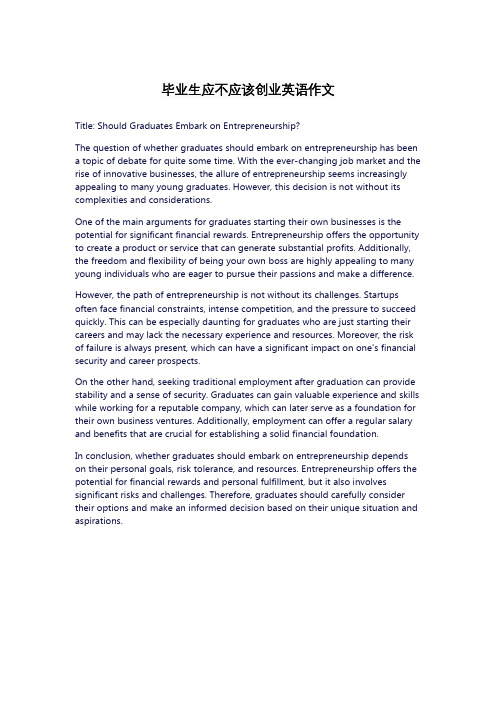
毕业生应不应该创业英语作文Title: Should Graduates Embark on Entrepreneurship?The question of whether graduates should embark on entrepreneurship has been a topic of debate for quite some time. With the ever-changing job market and the rise of innovative businesses, the allure of entrepreneurship seems increasingly appealing to many young graduates. However, this decision is not without its complexities and considerations.One of the main arguments for graduates starting their own businesses is the potential for significant financial rewards. Entrepreneurship offers the opportunity to create a product or service that can generate substantial profits. Additionally, the freedom and flexibility of being your own boss are highly appealing to many young individuals who are eager to pursue their passions and make a difference. However, the path of entrepreneurship is not without its challenges. Startups often face financial constraints, intense competition, and the pressure to succeed quickly. This can be especially daunting for graduates who are just starting their careers and may lack the necessary experience and resources. Moreover, the risk of failure is always present, which can have a significant impact on one's financial security and career prospects.On the other hand, seeking traditional employment after graduation can provide stability and a sense of security. Graduates can gain valuable experience and skills while working for a reputable company, which can later serve as a foundation for their own business ventures. Additionally, employment can offer a regular salary and benefits that are crucial for establishing a solid financial foundation.In conclusion, whether graduates should embark on entrepreneurship depends on their personal goals, risk tolerance, and resources. Entrepreneurship offers the potential for financial rewards and personal fulfillment, but it also involves significant risks and challenges. Therefore, graduates should carefully consider their options and make an informed decision based on their unique situation and aspirations.。
大学生应该估计创业英语作文

大学生应该估计创业英语作文(中英文版)Estimating the Value of Entrepreneurship for College Students对于大学生而言,估算创业的价值至关重要。
In an era where innovation and startups are thriving, it is imperative for college students to gauge the significance of entrepreneurship.This essay aims to shed light on the benefits that entrepreneurship can bring to students in their academic and future careers.在学术与职业发展的道路上,创业精神能够培育大学生的多项技能。
Firstly, engaging in entrepreneurial activities cultivates critical thinking skills, which are essential for problem-solving and decision-making.Moreover, entrepreneurship encourages students to take calculated risks, fostering a growth mindset and resilience in the face of adversity.其次,创业经历能够增强学生的团队协作与国际视野。
Teamwork is an integral part of any entrepreneurial venture, teaching students the importance of collaboration and effective communication.Furthermore, entrepreneurship often involves a global perspective, preparing students for the diverse and interconnected business world.然而,创业并非一帆风顺。
- 1、下载文档前请自行甄别文档内容的完整性,平台不提供额外的编辑、内容补充、找答案等附加服务。
- 2、"仅部分预览"的文档,不可在线预览部分如存在完整性等问题,可反馈申请退款(可完整预览的文档不适用该条件!)。
- 3、如文档侵犯您的权益,请联系客服反馈,我们会尽快为您处理(人工客服工作时间:9:00-18:30)。
大学生应该创业吗(中英文) According the least report, many students start their own business in order to get prepared for the future. Some students run on-line shops, some students start their own company. Their teachers and classmates have different opinions about this phenomenon. Some thought that have such experience can help them adapt better to society after graduation, while other said that running shops may occupy too much of the students’ time and energy. As far as I concern, I think doing business can benefit the students to some degree.
从最新的报道看,很多学生为了为将来做准备,自己做起了生意。
一些学生在网上开起了网络店铺,一些则拥有自己的实体店。
老师和同学们对此都有不同的看法。
一些人认为这样的经验能帮助他们在毕业后更好的适应社会环境,而一些人则认为做生意会占用太多的学习时间和精力。
就我看来,我认为自主创业能在某种程度上给学生带来好处。
大学生应该创业吗?Should College Students Do business?
Fist of all, running shops may bring some profit to the students, in this way, the students can reduce their family’s burden. Since the fee of the university is not that cheap. Second, when students do business, they can acquire professional knowledge, accounting skills and enhance their personal communication skills. For instance, to running a shop, they may use what they learn form the textbooks. Last but not least, these
experience can give them strength when they apply for a job because they have related experience. By doing business with others, they can learn how to cooperate with others and become more competitive in the job market.
首先,经营店铺可以为学生带来利润。
在这种情况下,学生能减轻家庭负担。
大学的学费可不算便宜。
其二,当学生们创业时,他们能够掌握专业的知识,计数能力,提高个人的交际能力。
例如说,经营一家店铺时,他们能够把在课本中学到的东西用到实际中去。
最后,创业的经验能在他们找工作时带来优势。
通过与他们做生意,他们知道该如何与他人合作,在人才市场更具竞争力。
To sum up, I think students should do business if they have the chance. It’s a good way to enhance personal abilities. I believe the advantages far outweigh the disadvantages.
总的来说,我认为,如果有机会的话,学生应该尝试去创业。
这是个提高个人能力的好方法,这其中,利大于弊。
